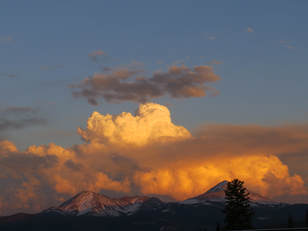 One of my favorite Old Testament figures is Elijah the prophet. Though we know little about him prior to his call to speak the message of God in opposition to an evil regime, we may unwittingly harbor a few misconceptions about him. Perhaps one of these is visualizing him only as an old man. In ancient times, age was thought to be synonymous with wisdom, so while we can be sure Elijah was an adult when he was called to deliver the messages of God, he was perceived by those who revered him to be wise, thus he has often been depicted as elderly, though hardy. He had a long tenure as a prophet, culminating in a dramatic exit from this life when a fiery chariot brought him into Heaven. (2 Kings 2) Even with his auspicious and quite unique departure, he did give many years of service to the Lord, which means that during at least part of his ministry he was not an old man. We may also mistakenly think of him as imparting nothing but challenge, with vitriolic words directed towards evil leaders such as Jezebel and Ahab. While he did indeed do that, he also acted with sensitivity for the poor and downtrodden, such as that shown to his hosts, the pagan widow and her son to whom he repaid kindness when they were about to starve. In gratitude and sincere care, Elijah prayed for them, and thus their oil and flour miraculously lasted until God lifted the drought after three years. (1 Kings 17-18) 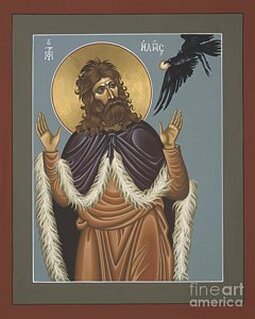 For the most part, Elijah did what all prophets do: he shook people up so that they would examine their way of life and make some changes in order to return to a relationship with God. What is most important is to remember that he loved God fiercely and this was the motivation for everything he did. He was a rather sensitive man, even if it seems like he had a constitution of steel; he loved mercy and compassion, justice and truth, but he was also vulnerable, even struggling with his ministry from time to time, just as any person of faith might. There were times when he prayed with obvious boldness, and times when he was so desperate for God’s help that he seemed ready to give up. Indeed, this is a realistic description of a true person of prayer. Prayer does not always mean we will experience consolation, but it rests on trust in God and in His love which enables us to make a response of love in turn. God gives us the gifts we need to move to action, including the gift of discernment which can be best developed by learning how to recognize God and how He acts, something which can only be done through prayerful consideration. 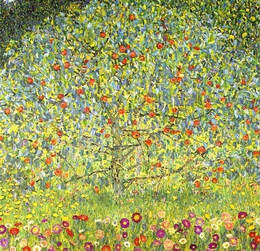 The story of Elijah can help us to see that the foundation of prayer is our relationship with God, a relationship grounded in covenantal love. It is true that the more time we spend with God, the more we get to know Him and therefore, the more like Him we become. In other words, to become holy, we need to do more than to say we desire it; we have to spend time with God in order to be open to His grace and to learn how to discern what leads us closer to Him and what leads us away, choosing accordingly. In the Scriptures Elijah is presented without any introduction, but we can imagine that he spent a long time cultivating a relationship with God in order to know His voice and therefore respond to it. Through his prayer, the disposition of his heart moved him to greater openness to God’s call. He had to love God greatly and rely completely on Him in order to have had the ability to stand before his enemies and challenge them. He had to know God in order to know the message he was to convey. This is also true for us: if we are to serve God, no matter how we are called, we need to develop intimacy with Him to discern how to proceed. 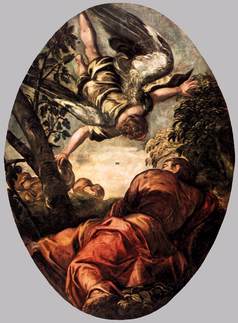 Our prayer, then, is an opportunity to get to know God better. It is also God’s opportunity to aid us in our ability to recognize Him, to share the depth of His love for us, and to empower us so that in whatever way we are gifted we might live a prophetic life, that is, a life in which our faith is obvious. (Remember, in baptism we were anointed as priest, prophet, and king!) A good example is found in the story of Elijah when he confronted the king and queen who were ruining Israel with their poor example and pagan practices. He had a public confrontation with their ‘prophets:’ through Elijah’s prayer God revealed His power, proving that the prophets were indeed false, leading to their demise and the people’s return to the one true God. But the evil Queen Jezebel sought to kill Elijah who fled out into the desert so depressed and frightened that he prayed for death at God’s hands rather than hers. The writer was not implying that Elijah, who had previously been amazingly bold, was retreating in a startling ‘about-face,’ but rather he was indicating that after a long, three year battle he was almost completely spent, having tried his best. (And who of us has never felt like that?) Therefore God sent an angel to guide Elijah to Mt. Horeb where He revealed His presence in the most gentle, tender way. God knew beyond Elijah’s words what the prayer of his heart truly was. Elijah did not really want death; but he was feeling desperately alone and needed friendship. And friendship is exactly what God gave him, both through His own loving presence and through the gift of Elisha, a prophet/companion who met Elijah as he came down from the mountain. (1 Kings 18-19) 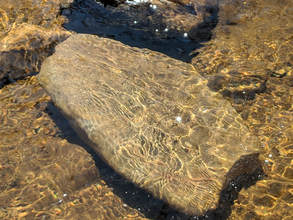 The point of this is that we are all called to live prophetically as true people of prayer. Because prayer is about a relationship, we can be like Elijah, being moved to make a loving response to the call of God, accepting our vulnerabilities as well as our strengths. Time spent with God in prayer will help us to learn discernment so that we will have a sense of when it is time to act and when it is time to ‘retreat and recharge,’ just as Elijah so poignantly learned. Discernment also teaches us that not all are called to confront the power structures of the world face-to-face, but that we are called to confront anything that leads us away from God, something which can be done through the way we live our lives, the daily choices we make, how we vote, how we use our resources, and the witness we give by helping the poor, the alien, the lonely, and the marginalized. It is done by offering mercy, especially when mercy is absent, as a witness to those who have forgotten what it is to use power correctly. And like Elijah, one of the greatest of the prophets, turning to God in our prayer daily is essential in learning to trust that He knows the depths of our hearts and that He will always guide us to Himself. 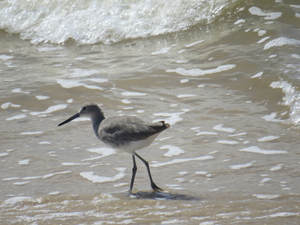 Perhaps spending a little time with Elijah through reading and praying with the Scriptures from 1 Kings 17 through 2 Kings 2, we can be inspired by his actions, his leadership, and his sincere care and concern for others, even those of different faiths and backgrounds. We can even be taught by the vulnerabilities which led to the complete disposal of himself to God for help, something we should do when we feel like everything we do is turning to dust. Elijah teaches us to discern: he could have ignored the angel who instructed him to go to the mountain, but relying on his faith through prayer, he recognized that he was being led to God. Elijah shows us that the actions which lead us to God do save us and they do reveal the greatness of God’s love. Let us be like him, searching and acting, witnessing and trusting: ultimately accepting the gift of God’s love from which all life flows. 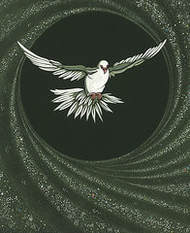 May we trust in the Holy Spirit to guide us through the choices of our daily life! May we spend time with God in personal prayer so that we learn to recognize the movements of the Holy Spirit! May we grow in our faith, hope, and love as well as in our courage to act! May we offer mercy and compassion where it is needed, including to ourselves! May we recognize our call as prophets, enlivened at Baptism, so that we may have a clearer understanding of the witness of our actions and how they affect others! And may we come to a deeper intimacy with God so that we learn to recognize Him in every moment of our lives! Let us continue to meet in the Heart of Jesus! Peace! ©Michele L Catanese Notes: The next post will be on August 13. Also, a few words on distractions in prayer: Distractions are indeed part of prayer, and if all we seem to do is wrestle with them during any particular prayer time, we should offer these to God, too. He will accept our distractions as much as He will accept prayer which ‘flows easily.’ It is what is in our hearts that matters and it is our time spent with Him which He cherishes, not the ‘quality’ of our prayer. Distractions are not all bad, and in fact, they can help us to understand a lot about ourselves. They can reveal what areas need healing, where our weaknesses lie, what concerns us, what we might struggle with, and even can reveal who and what we love. Therefore, distractions can actually be useful if we pay attention to them. Images: 1. This is a photo of the setting sun which I took in Silverthorne, Colorado. The fiery appearance of the cloud and the mountains made this seem like a fitting choice given that fire and cloud are Old Testament symbols for the presence of God's Spirit (Shekinah). The image also made me think of the fiery whirlwind which took Elijah into Heaven. 2. This is an icon by Fr. William Hart McNichols called Holy Prophet Elijah. It depicts the raven feeding Elijah at the beginning of his ministry in 1 Kings 17, (specifically verses 4-6). I like that Fr. Bill painted Elijah as a younger man with dark hair and confess to this being an inspiration for some of my thoughts on Elijah. You can find this icon at http://frbillmcnichols-sacredimages.com/featured/holy-prophet-elijah-009-william-hart-mcnichols.html. 3. This painting by Gustav Klimt called Apple Tree (1912) seemed to fit here for a lot of reasons. The first is that one has to be quite attentive to this painting in order to see where the tree begins and the flowers in the surrounding grass end. In other words, one has to spend time learning to discern 'what is what' in the painting. It also spoke to me of the bounty with which God nourishes us, not just through food, but by spiritual nourishment which comes to us through the graces with which He feeds our souls. You can find more description of this painting at http://www.reproduction-tableaux.fr/produit/klimt-pommier/ 4. In a completely different style and period of history, this is a painting by Tintoretto called Elijah Fed by the Angel. (1577-78) This is a depiction of Elijah in the desert just after he prayed for death, when God sent His angel who fed Elijah so that he had the strength to make it to Mt. Horeb where he was told that God would meet him. Again, I love that Elijah was painted as a younger man: his hair is brown, and if one looks really closely, one can decide if he even has a beard. (I cannot detect one, and if so, I suspect it is not to denigrate his wisdom, but to give a sense of his vigor, which is now seemingly stretched to the limit.) You can find this painting at https://wga.hu/html_m/t/tintoret/3b/2upper/1/ and also at https://wga.hu/support/viewer_m/z.html. 5. I took this photo of a rock under water in a crystal clear river in Colorado. I chose to use it here as a symbol of our need to be transparent with God. Transparency may make us feel vulnerable, but when we are empowered by the Holy Spirit, and truly try to follow His movements, our transparency is what enables us to live prophetically. People will see God and His message through our words and deeds, even when we do small things. 6. This is a photo I took at the shoreline in Matagorda, Texas. This plover was running into and then out of the surf in what looked like a funny dance, but was actually its way of finding food. I chose to use it here, however, because the bird had to know when to be led into the water and when to move away from the powerful surf: it is an example of discernment as we seek to know whether something is moving us toward God or away from Him. And of course, we choose what moves us toward Him. 7. Finally, this image of the Holy Spirit is an inset from a larger icon by Fr. William Hart McNichols. He calls it Viriditas - Holy Spirit Detail. You can find it at http://frbillmcnichols-sacredimages.com/featured/viriditas-holy-spirit-detail-william-hart-mcnichols.html. In compliance with GDPR rules, I wish to make it clear that I do not gather any information on any of my readers at any time.
Tony C
7/30/2018 03:42:39 pm
Thanks again for another inspirational commentary.
Carmella Wygant
7/31/2018 10:27:12 am
Having recently been on a three week walk with God I found this post to be absolutely affirming and uplifting. I find your insight is reinforcing and assuring. Peace to you.
David
7/31/2018 11:01:41 am
Michele,
Joanie
7/31/2018 11:05:44 am
Great thoughts during our drive home. Thank you.
elise m campana
8/2/2018 08:27:02 pm
I was so inspired by your teaching on Elijah. He and Elisha are my Comments are closed.
|
Heart Speaks to Heart
|

 RSS Feed
RSS Feed

